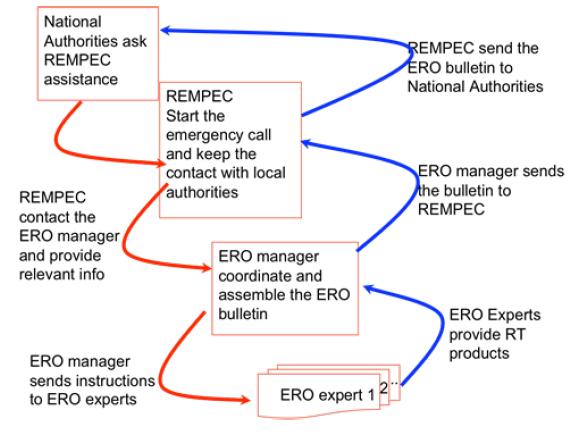MONGOOS
About MONGOOS
MONGOOS was established by the Memorandum of Understanding in 2012 as a merging of Mediterranean Operational Oceanography Network (“MOON”) and MEDGOOS to consolidate the activities related to the production and use of operational oceanography services in furtherance of four principal objectives:
- Improved Fitness for Purpose. Continuously advance the scientific understanding and technological development upon which the Services are based.
- Greater Awareness. Promote the visibility and recognition of the Services with governmental agencies and private companies, encourage their integration at national, regional, European and global levels.
- Increased mainstreaming. Enhance the usability of the Services and their usefulness for policy implementation, societal needs and science.
- Improved Capacity. Support the planning and implementation of international initiatives involving operational oceanography and promote the participation of non-EU Mediterranean countries in producing the Services.
MOON partners and REMPEC signed in 2008 an Emergency Response Collaboration Agreement for the Mediterranean Region with a view to ensuring maximum coordination of the work and activities of REMPEC and MOON in respect of matters of common interest. The agreement was renewed as a collaboration of MONGOOS partners and REMPEC in 2015.
Within the MONGOOS&REMPEC agreement the MONGOOS Emergency Response Office is established to support REMPEC in case of emergencies at sea.
Status
MONGOOS counts 36 partners from the Mediterranean Countries. Three MONGOOS partners (CMCC, ICTS SOCIB and IASA/AM&WFG) are part of the MONGOOS&REMPEC agreement and all relevant MONGOOS partners contribute by providing information and products.
Obligations and responsabilities
MONGOOS partners and REMPEC have agreed to collaborate for the following activities:
- utilise the MONGOOS Members’ expertise in the activities which are regularly carried out by REMPEC (e.g. training, organization of workshops, conferences and assistance in contingency planning);
- collaborate in assisting the Mediterranean coastal states, upon request, in emergency situations. In particular, relevant MONGOOS Members will provide the Centre with meteo-oceanographic forecasting data and oil spill drifting predictions for the affected area, for prompt dissemination by REMPEC as appropriate. The MONGOOS Members will further endeavour to identify and establish contact with other relevant oceanographic institutes which could assist REMPEC during the emergency phase;
- collaborate in the development of projects for the prevention of operational pollution from ships in the Mediterranean region. The relevant MONGOOS Members will make available meteo-oceanographic data and oil spill applications (forecasting/hindcasting modelling) to enhance the possibility of identifying the polluting ship;
- collaborate in the development of the MONGOOS Network with a view to enhancing high resolution meteo-oceanographic forecasting data in areas of the Mediterranean where at present there is a lack of data; and
- cooperate in the development of oil risk maps for the Mediterranean region. REMPEC will contribute to fine tuning the development of these maps through its knowledge regarding marine pollution from ships and, where possible, by providing data on the main shipping lanes in the region.
Roles and services
A virtual MONGOOS Emergency Response Office (ERO) is established to serve as the coordinating body for MONGOOS Members to receive, evaluate and disseminate information. The ERO consists of an expert board to which each Party has nominated one expert, and is headed by an ERO Manager nominated by the board (currently Dr. Giovanni Coppini).
Procedure
The following procedures describes the steps for the request of support to the ERO of MONGOOS:

- Phase 1: REMPEC will contact by phone the ERO Manager using the given telephone number and informs him/her that an emergency is ongoing. ERO-Manager can also be contacted using email ero-manager@cmcc.it
- Phase 2: REMPEC provides by email the relevant information (accident location, accident time...) on the emergency to the ERO Manager.
- Phase 3: ERO manager acknowledges the reception of the emergency call (via email, telephone call). In this phase ERO-Manager could ask for clarifications on the provided information. Just afterwards the ERO-Manager will activate the ERO Experts by email. In this email the ERO-Manager will also propose which ERO partners should participate to the emergency call on the basis accident location and the characteristics of their systems and products:
- Forecasting model domains
- Availability of ancillary data (wind, waves, SST)
- Availability of satellite oil spill observations
Invited ERO partners will have to acknowledge the participation to the emergency support activities.
- Phase 4: ERO manager will decide, eventually consulting ERO partners, the technical details needed to run the models and to produce the outputs:
- Graphical details (palette scale, domain of the figures to be produced...) on the basis of the time of the accident and location;
- Information needed to run the models that may be not available in the first (Duration of the spill, type of oil ...);
- Output frequency of oil spill forecast, duration of the forecast;
ERO Manager will send these information (technical sheet) to the ERO partners. The technical sheet contains the preliminary info sheet.
Note: the Technical sheet can be re-issued at any time when new information became available.
- Phase 5: ERO activated partners will start at this point the simulations and will start to process their data (satellite...). Once available results of the simulation and satellite products will be available will be sent to the ERO Manager.
- Phase 6: ERO will first issue an ERO Bulletin in few hours with meteo-oceanographic information in the sub-region of interest and with the oil spill forecasts.
- Phase 7: ERO will continue to follow the emergency case until REMPEC request support, issuing updated bulletins on daily basis.
- Phase8: ERO, after each REMPEC call, will prepare a short note on possible improvements of procedures and protocols and lesson learnt. The objective is to improve the procedures step by step. REMPEC and users may be asked to fill an evaluation report including the feedback from the users and estimate of the advantage (timing, kind of information...) of the service.
Conditions
The services provided under the REMPEC-MONGOOS Collaboration Agreement will be free of charge.
Contact
|
Website: www.mongoos.eu |
ERO manager: Giovanni Coppini Email: giovanni.coppini@cmcc.it Mobile: +39-392-3857919 |


